It's 20 years since Darlington reached Wembley for the first time ever, only to lose to Plymouth Arg...
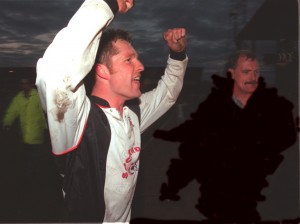
It's 20 years since Darlington reached Wembley for the first time ever, only to lose to Plymouth Argyle in the play off final.
One of Darlington's heroes that season, Robbie Painter, spoke to Ray Simpson earlier for the Darlington programme.
Robbie arrived at Feethams in 1993 in search of regular first team football from Burnley, who were then a division above Quakers.
He’d already been to Chester City and Maidstone, but found himself squeezed out at Turf Moor, and was eager to play regularly.
“I wasn’t getting game time at Burnley, even though we won the old Fourth Division title in season 1991-92,” he said. “They wanted to play me on the right side, but I wanted to play in my favourite position in the middle, and so the club decided to let me go out on loan so then I could get some games under my belt. Clive Middlemass, the Burnley assistant manager, had a word with Billy McEwan, the Darlington manager, to say that I was available.
“Billy got in first, and I jumped at the chance to join Darlington. I think there were a couple of other clubs sniffing around, but they were southern-based, and I didn’t want to go back down south because I’d just been to Maidstone. Going to Darlington was within reason.
“The deal was for a month’s loan, which then became another month, but then Billy got the sack (this was in October 1993) and was replaced by Alan Murray.
“Alan must have liked me, because he signed me for an undisclosed sum on a two year contract from Burnley.
“However, Alan went after an indifferent season in 1994-95, then we briefly had Paul Futcher as manager, and then Eddie Kyle finished the season.
“David Hodgson and Jim Platt were then appointed, and they completely changed the way we played and trained. Hodgy brought in some decent players, and Robbie Blake also came through the youth team and made an impression. He added more goals to the side. We had a really good team, we knocked the ball about, and most of us were young and confident. Plus we had the experienced Gary Bannister, who could play a bit.”
Robbie scored nine goals in the 1995-96 season, with Quakers only losing one away game in the league, at Chester City. Darlo won ten away league games that season, and if they had won at Scunthorpe in the last league game instead of drawing 3-3, then automatic promotion would have been theirs.
“We couldn’t get into the lead,” said Robbie. “We were all over them in the last 15 minutes, and Robbie Blake fired just over the top near the end. We were really confident away from home, and really we should have gone up without going to the play offs. We were really disappointed about that.”
The play off semi final matched Darlo with Hereford United. “We were really confident in the first leg at their place, because we didn’t fear anybody away, and we won 2-1 after they took an early lead.
“Feethams was bouncing for the return leg in the following midweek, and I made it 3-1 on aggregate when Gary Bannister smashed the ball into the box, and the ball went off me into the net. Everyone knows what happened next, we went on to win 4-2 on aggregate.
“The celebrations on the final whistle were fantastic. All the players went up into the stands in front of the cheering crowd, then we went into the cricket club. I remember going in there and everyone cheered, and we sang “We’re going to Wemberley” all night.
“It was great to get there, and the whole Wembley experience was amazing. I think the only let down was that we didn’t go to see Wembley the day before and get a feel for the stadium.
“It was a great experience going there on the bus, and seeing all the fans, but maybe we were overawed a little when we went out on to the field.
“We played ok on the day, but I don’t think we played well. We didn’t have many chances. Mattie Appleby had one early on, and in the second half Steve Gaughan got away down the left and put a cross into the middle for me. But I had gone near post, he put it to the far post and we had a right barney about it. We still argue about it now every time when we meet up. I just settle the argument by reminding him that he was subbed five minutes after that!
“We didn’t really get going in the final. We were confident because we had beaten them twice in the league, but maybe we were just overawed in the game itself.”
There haven’t have been many better nights of watching Darlo than the first leg of the Worthington Cup second round tie against Leeds United at Elland Road just after the start of the following season.
Twice Premiership Leeds, with well-known players like Ian Rush and Lee Sharpe in their side and George Graham in charge, went ahead with goals by Danny Wallace, but battling Quakers pegged them back to 2-2. Darren Roberts had scored Darlo’s first equaliser.
“I’d been in and out of the team that season, and at Leeds I was on the subs’ bench,” said Robbie. “Darren Roberts had arrived during the summer, and he and Robbie Blake played up front. I came on in the second half for Blakey. I really felt that I had a point to prove when I came on, that I should have started the game.
“We were trailing 2-1 when Gary Twynham played the ball through to me. I got away from my man, controlled the ball, ran into the box, sidestepped their keeper Nigel Martyn, and slotted the ball into the net. There was a huge roar from our fans.
“I ran to my left, then I remembered where our fans were, and I made a massive double back to celebrate with them. It was a great moment, one that I’ll always remember, and I’m sure the fans will too.”
But despite his memorable goal, Robbie was back on the bench for the next game, and his Darlo career soon came to an end.
“Things were coming to a close. It was like Burnley again when I wasn’t playing regularly. I didn’t want to be on the bench, I wanted to start games.”
Robbie joined Rochdale, Quakers’ rivals, and he had a great first season.
“I scored 18 or 19 goals, and there was talk of me getting a move to a higher division. But in my second season, I had a few injuries, a new manager came in, and I was given a free. There was talk of me coming back to Darlington after they’d moved to the new stadium and I actually went to a game and spoke to Hodgy, but nothing materialized.
“I joined Halifax, and in hindsight that was a mistake. I really wish I hadn’t signed for them. The dressing room was unsettled there, some of the big players at the club wanted out. It was really, really bad.
“I left Halifax, which meant I was out of the full time game at the age of 31. I had spells at Gateshead, Bradford Park Avenue, Ossett Town and Emley, but overall I struggled with the pitches. I was going through the motions and slowly losing interest.
“By then, I was studying for a degree in physiotherapy, and there wasn’t enough appeal to keep me in the game. I qualified at the age of 36, and became a full time physio with my own business. I completely lost interest in the game, hardly followed the results.
“I’m married with a family now, and I’ve got a son and a daughter. The lad has brought me back into football, because he wants to play, so I’ve done a few coaching courses and I run an under 8 team.
“My wife didn’t know much about my football past, until one day we were coming back from holiday through the airport. Suddenly, in the airport terminal, I could hear six or seven people singing “Super Robbie Painter!” Some Darlo fans had recognized me and were singing that song. My wife couldn’t believe it, she never stopped talking about it for days afterwards.”
A bit like your goal at Leeds, Robbie. Darlo fans still talk about it.



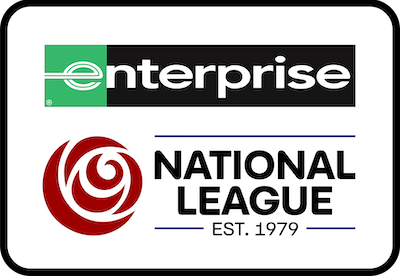
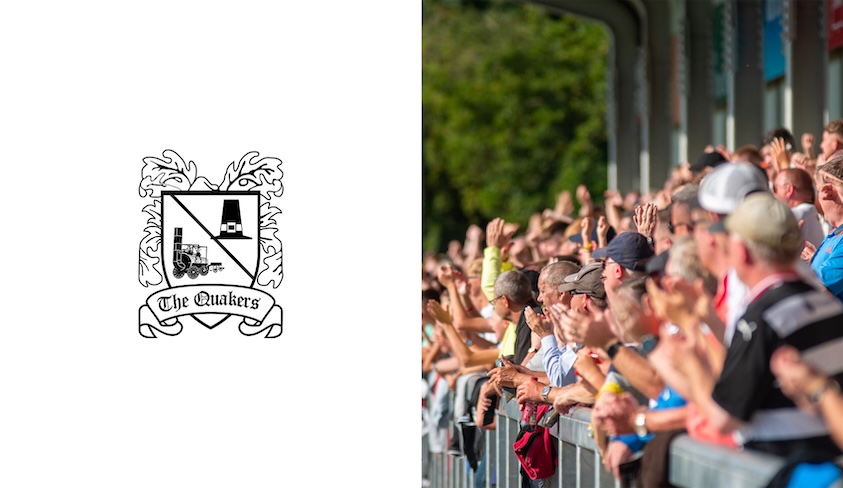
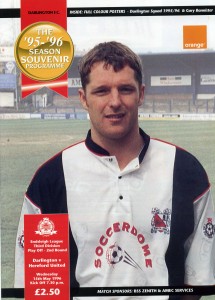
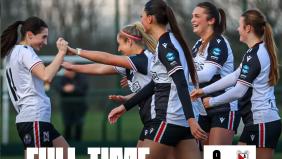
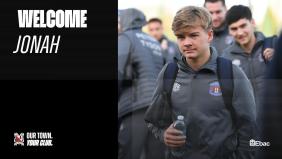
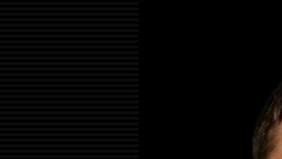
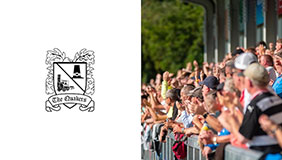

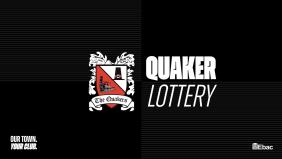
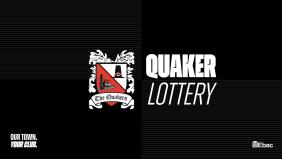
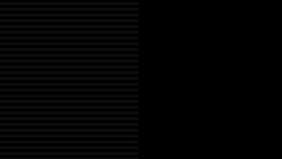
-article-list.jpg)